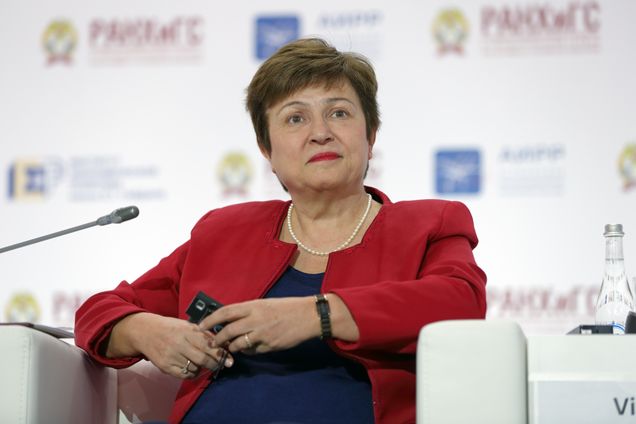Experts React – IMF Managing Director Kristalina Georgieva Receives a Second Term

On April 12, just prior to the 2024 International Monetary Fund (IMF)/World Bank Group Spring Meetings in Washington, D.C., the IMF Executive Board voted to renew Kristalina Georgieva as IMF Managing Director for a second five-year term starting in October.
In her first term, Georgieva played an instrumental role in the Fund recognizing climate change as macro-critical – thereby placing it within the IMF’s mandate to address. The next five years, however, will be critical in the lead up to 2030, and while the IMF’s leadership on climate has been welcome, opportunities for bolder leadership remain.
What are concrete ways Georgieva can support more ambitious climate policy at the IMF? How can the Resilience and Sustainability Trust (RST), its climate-focused lending tool, better catalyze impact in RST program countries? And how can aligning the Fund with the Paris Agreement bring the global community closer to achieving shared development and climate goals?
Members of the Task Force on Climate, Development and the IMF, which has published a preliminary assessment of the IMF’s efforts to integrate climate into its operations, offer their expert reactions:
IMF Managing Director Georgieva’s second term is a crucial opportunity for the Fund to align itself with the Paris Agreement. First, the IMF lending toolkit needs to support countries in achieving their development-positive climate goals. This will require the Fund to shift away from austerity policies and towards resource mobilization to generate climate-resilient and low-carbon economic transformation. Second, the IMF must address how debt instability is constraining climate action. Breaking the vicious cycle between climate change and debt distress will require investing in resilience, deploying anticipatory instruments and scaling up pre-arranged financing. Climate resilient debt clauses are important shock absorbers, and the IMF should embed them into its toolkit. Replenishing the Catastrophe Containment and Relief Trust and expanding eligibility to access its financing will also be vital. Finally, the IMF needs to elevate the voice of climate vulnerable economies in its governance by recognizing the Vulnerable Group of 20 (V20) as an official inter-governmental group. Climate change has moved from the periphery to a central concern, and it is crucial for the IMF’s governance to better represent those most impacted by climate change.
Scaling the Resilience and Sustainability Trust to match climate needs
During her first term as the IMF Managing Director, Georgieva commendably began to mainstream climate change across the Fund, and under her leadership, the IMF took an important step to expand and complement its lending toolkit by creating a new instrument, the RST, which is designed to provide much needed longer-term, concessional financing to developing countries to help them deal with key structural challenges such as climate change.
In her upcoming second term, the Task Force encourages Georgieva to take bolder and faster actions in order to make the RST an important, transformational part of the global financial architecture, especially for highly indebted, climate-vulnerable countries. One effective way forward is for the IMF to deploy more RST resources to expand fiscal space for climate action through debt relief solutions that are timely, fair and effective and aligned to a country’s national climate and development plans.
Institutionalizing collaboration with the World Bank on climate change
The Task Force welcomes Georgieva’s continued leadership of the IMF. The IMF plays a central role in promoting global financial stability and cooperation, which supports countries’ sustainable development and growth. It has a broad agenda to help countries address critical macroeconomic challenges.
In this context, recognizing impacts arising from climate change has been a laudable move. As the IMF deepens its work on climate change going forward, it should strengthen its institutional partnerships with the World Bank and other multilateral development banks (MDBs) to leverage their expertise and country-level engagements and make the climate transition work for stability and development.
Managing debt sustainability and the energy transition in Africa
Although African countries contribute just 4 percent of global carbon emissions and suffer the brunt of climate change, 45 nations have submitted ambitious emissions reduction targets in their updated nationally determined contributions. This is because those countries see the energy transition as an opportunity to create green jobs and reduce poverty. However, a recent technical paper from the Task Force shows that climate change will increase debt burdens.
Recent global crises such as COVID-19 and the war in Ukraine have increased the number of African countries in debt distress, threatening to slow the energy transition. Nineteen countries are in debt distress, and Ghana, Zambia and Ethiopia have defaulted on their foreign debt. Additionally, the worsening debt situations have led to large exchange rate depreciations, triggering balance of payment challenges.
Bolder leadership from Georgieva on climate will be vital in the years leading up to 2030. To increase African governments’ ability to invest in mitigation and adaptation, the IMF could help speed up the reallocation of Special Drawing Rights (SDRs) by MDBs, such as the African Development Bank. This would create the opportunity to significantly increase resources that can be lent to governments and the private sector to address climate risks and enhance development.
The IMF and the World Bank could also accelerate reforms of the Debt Sustainability Framework (DSF) to account for “positive” debt, such as debt on green growth-producing assets like infrastructure investments for renewable energy, clean technologies and clean transportation that would accelerate the energy transition across the continent.
Leading global policy coordination efforts on sources of finance
Georgieva’s renewed leadership provides an opportunity for the IMF to champion coordinated efforts in securing diverse and sustainable sources of finance to combat climate change. Beyond advocating for traditional revenue-raising instruments like carbon pricing, the IMF can also lead discussions on innovative financing instruments that mobilize private investment. This includes blended finance, sustainable financial products and digital currencies. By leveraging these strategies, the IMF can accelerate the transition toward a low-carbon future.
Institutionalizing climate policy at the IMF
Managing Director Georgieva’s continued leadership at the IMF will be welcome. Over the course of her new term, however, the global community will need to make rapid cuts in greenhouse gas emissions and mobilize unprecedented amounts of resources – $3 trillion for emerging market and developing economies excluding China – and this must be done in a manner that is both fiscally sound and financially sustainable.
She has the opportunity to do two important things: first, institutionalize climate policy in the IMF and ensure that the IMF’s surveillance activities utilize the best available science to track climate risks and uncover opportunities for growth and economic transformation. In her first term, the IMF launched its strategy to help its members address climate change. This strategy will need to be bolstered to ensure that it meets the needs of the IMF’s membership, and the IMF Executive Board must ensure she has the resources to execute an enhanced climate strategy. Second, she must support efforts to generate international public climate finance to ensure that governments have wind in their sails for ambitious, bold and swift climate action. The IMF’s analytics could play an important role in clarifying the possible sources of international public climate finance and help facilitate a policy dialogue around concrete options.
*
Never miss an update: Subscribe to the Task Force newsletter.





